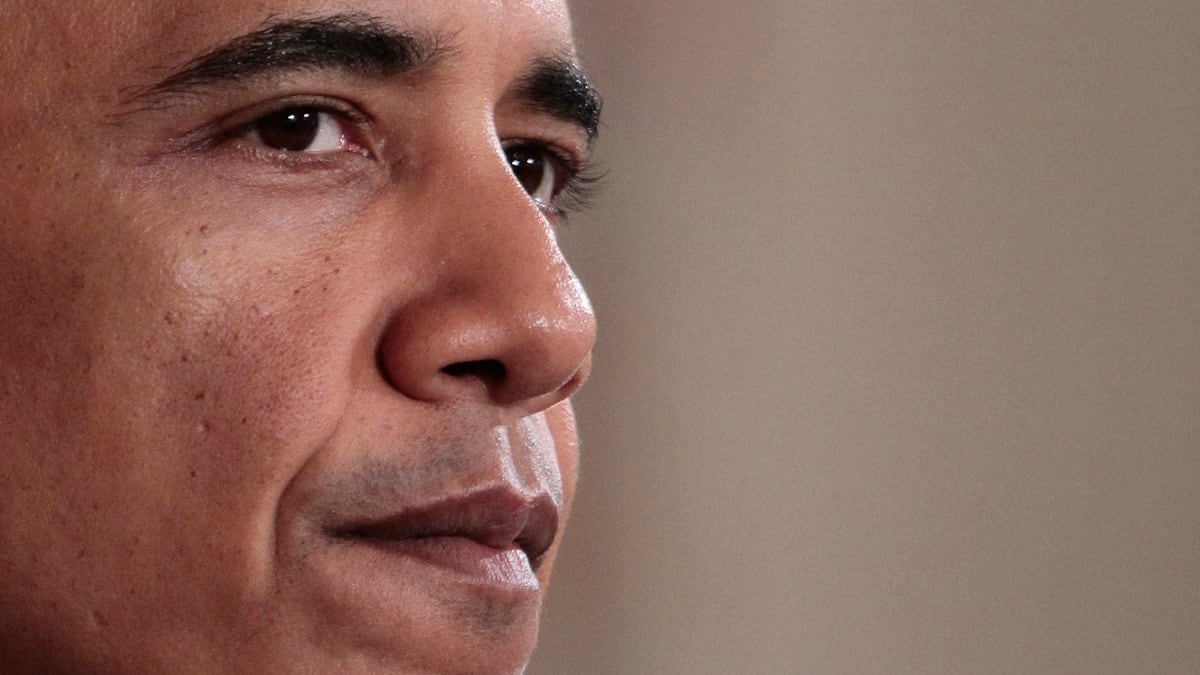Last Friday’s decision by a three-judge panel of the 11th Circuit Court of Appeals in Atlanta, holding the individual mandate portion of the Affordable Care Act (ACA) unconstitutional, will almost surely force a Supreme Court decision next year, many legal analysts believe. So, bam, right in the middle of a presidential election, we’ll have the biggest and most political high-court decision since Bush v. Gore—and one with far greater destructive potential as precedent. The standard liberal position is to fear that the court will overturn the ACA. Sure, I fear that. But I also fear the political consequences on next year’s election of the court upholding it and worry that those consequences could be even worse for the progressive cause.
First, let’s talk about the former scenario. If the act is overturned, it will be a disaster in terms of legal precedent and health-care substance. In legal terms, a ruling that holds that the Commerce Clause can’t be used the way Congress used it to write and pass the ACA deals a terrible blow to a whole body of jurisprudence that has helped support and sustain the New Deal since Franklin Roosevelt’s second term. After failing in his court-packing scheme, FDR finally was able to start naming justices to the court who granted Congress wider leeway in regulating economic activity. A 1937 decision upholding Congress’s right to establish a minimum wage helped build a posture the court has basically maintained ever since. As we know all too well, this court appears ready to go back to pre-1937 thinking and in fact already has, in the Citizens United case.
An overturning would also be horrible in terms of health-care substance. It is true that the 11th Circuit, in addition to finding the individual mandate unconstitutional, pronounced it “severable” from the rest of the act. This is a nice legal distinction, but as a practical matter it probably doesn’t help the bill’s prospects. Without the mandate requiring all Americans to buy insurance, the premiums for those who do buy it would shoot up, which would probably be unsustainable: Congress would need to pass much higher subsidies than the ones included in the bill, or an alternative to mandates—i.e., a public option or something like it (which is, of course, highly unlikely).
And of course politically it would be a crushing defeat for Barack Obama: his signal legislative accomplishment, tossed out by the court. What a failure! What would he have left to run on?

Yes, it would be a defeat, and it would make him look weak for a few days while the cable channels nattered about it. But I can’t help thinking about the political downsides of the other scenario, too, and they may be worse.
Consider an announcement from the Supreme Court next May or June that a 5-4 majority, including the four liberals and Anthony Kennedy, has upheld the ACA. What happens? The administration breathes a sigh of relief. But who actually celebrates? Not many people. Liberals are generally ambivalent about the act and always have been.
Meanwhile, who is infuriated? Millions of conservatives. “Obamacare” becomes a hot-button issue all over again. If you think conservatives can’t get any angrier than they already are, well, you and I have been watching very different conservative moments these last few years. They can always find something new to get mad about. And a court-imposed “socialistic” outcome, forced on decent, freedom-loving Americans by four liberals and that sodomy-endorsing Kennedy, is a pretty big something.
There are multimillionaires and billionaires out there who will throw money at independent expenditure campaigns focused on health care: elect a president and a Congress who will finally rid us of this pestilence once and for all. “Repeal Obamacare” becomes a rallying cry all over again. I’ve heard people I respect say they don’t think it would be such a big deal, that the campaign at that point will be about jobs and the economy. Well, maybe. But as I recall, Republicans weren’t especially shy about advertising the alleged job- and economy-killing aspects of the ACA. Not to mention the Medicare cost-cutting elements, which as we know were a prominent feature of last year’s GOP campaigns.
Again I ask of liberals who think Republicans won’t repeat every one of these moves all over again: what conservative movement have you been watching?
Could it be argued that the right will do these things but they won’t matter because “most” voters will care more about jobs? It could. But isn’t it just as likely that getting smaller subsets of voters hopping mad about health care all over again can goose turnout enough to mean the difference between winning and losing in some states? Of course it can.
On legal and substantive grounds, I hope the act is upheld. It’s more important than Obama, and maybe it can survive and be strengthened over time. But the political price of upholding it might be very high indeed.






